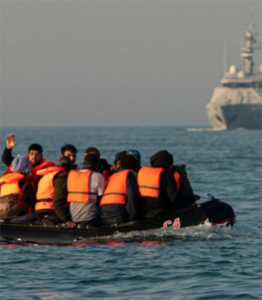Migrant boat arrivals sparks debate in UK
Migrant crossing of the English Channel are on the rise and may surge even further following the Taliban takeover in Afghanistan.
French maritime authorities say there have been 556 ‘operations’ involving 12,148 migrants attempting to cross or crossing the Channel by boat so far this year, compared to 868 events involving 9,551 migrants in all of 2020.
 Britain’s Home Secretary Priti Patel has met her French counterpart to press France to do more to stop a surge of migrants using small boats.
Britain’s Home Secretary Priti Patel has met her French counterpart to press France to do more to stop a surge of migrants using small boats.
In 2020, about 8,500 people made the journey, and several died in the attempt.
Migrants have long used northern France as a launching point to reach Britain, either by stowing away in trucks or on ferries, or — increasingly since the coronavirus pandemic disrupted international travel — in dinghies and other small boats organised by smugglers.
The British and French governments have worked for years to stop the journeys, without much success.
Earlier this year, Britain agreed to give France 54 million pounds, or $A100 million, to help fund extra police patrolling French beaches.
British Prime Minister Boris Johnson said stopping the crossings depended largely on the French authorities.
“We depend to a large extent on what the French are doing, but clearly as time goes on and this problem continues, we are going to have to make sure that we use every possible tactic at our disposal to stop what I think is a vile trade and a manipulation of people’s hopes,” he the House of Commons.
Refugee activist groups said the government’s tough stance was pointless, and urged the government to make it easier for asylum-seekers to safely come to the UK.
Director of Detention Action Bella Sankey said Ms Patel should “reach an agreement with her French counterpart to develop a humanitarian visa which would give safe passage to those likely to be recognized as refugees in the UK.”
French politician Pierre-Henri Dumont, who represents the Calais region of northern France, said trying to stop migrant trying to cross was all but impossible.
“The fact is, we’ve got 300 to 400 kilometres of shore to monitor every day and every night, and it’s quite impossible to have police officers every 100 metres,” he said in an interview with the BBC.
“We cannot stop all the crossings. We need to address the causes of migration,” Mr Dumont said.
Meanwhile, twelve Church of England bishops have accused the government of criminalising “Good Samaritans” who seek to save the lives of migrants crossing the Channel in small boats.
The bishops, who speak on asylum and refugee issues within the church, said a new nationality and borders bill before parliament is an “affront to justice” by putting the saving of life under a legal penalty.
Under the bill, migrants could face up to four years in prison. Plans put forward by Ms Patel will require Border Force vessels to turn back migrant boats rather than bringing passengers safely into the UK.
International and maritime law says assistance must be given to people in distress at sea. Article 98 of the UN Convention on the Law of the Sea mandates that every state requires its ships “to render assistance to any person found at sea in danger of being lost”.












